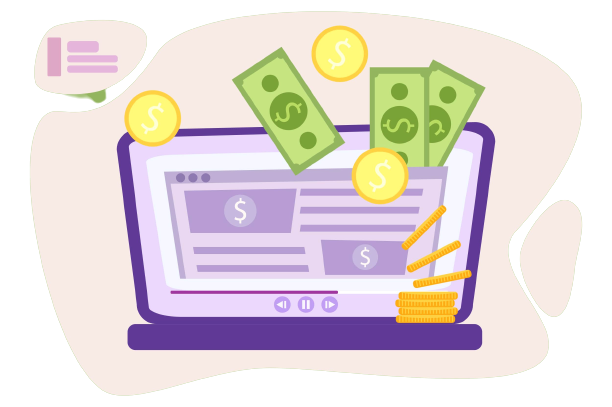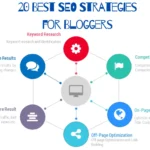How to Monetize Your Blog Effectively

17 August 2023
Welcome to the digital realm, where blogging has become a powerhouse for individuals and businesses alike. Whether you’re a seasoned blogger or just starting out on your journey, one thing is clear – you want to monetize your blog effectively! After all, who wouldn’t want their passion project to also bring in some extra income? In this blog post, we’ll explore the different ways you can turn your blog into a money-making machine. From advertising and affiliate marketing to sponsored content and product sales, we’ll cover it all. So grab your favorite beverage and let’s dive into the world of blog monetization!
What is Monetization?
Monetization, in the blogging world, refers to the process of turning your blog into a revenue-generating platform. It’s all about leveraging your content and audience to earn money. While many bloggers start out simply sharing their thoughts and experiences, monetizing your blog can take it to the next level.
There are various ways you can monetize your blog, each with its own advantages and disadvantages. One popular method is advertising, where you allow ads to be displayed on your website in exchange for payment. This can be done through ad networks like Google AdSense or by partnering directly with brands.
Affiliate marketing is another effective way to monetize your blog. By promoting products or services and earning a commission for every sale made through a special affiliate link, you can generate income while providing valuable recommendations to your readers.
Sponsored content is yet another avenue for generating revenue from your blog. In this case, brands pay you to create content that promotes their products or services. This could include sponsored posts, product reviews, or even social media collaborations.
Selling digital or physical products directly on your blog can also bring in some cash flow. From e-books and online courses to merchandise and workshops – there are plenty of options depending on your niche and expertise.
Each method has its pros and cons. Advertising may provide a consistent stream of income but could clutter up your website’s aesthetics if not managed properly. Affiliate marketing allows for passive income but requires careful selection of products that align with both yours and your audience’s interests. Sponsored content offers lucrative opportunities but risks compromising authenticity if not approached thoughtfully.
Determining which method works best for YOUR blog depends on several factors including niche relevance, target audience demographics, and personal preferences as well as future goals.
Stay tuned as we dive deeper into each monetization strategy so you can make an informed decision about what will work best for YOU!
The Different Ways You Can Monetize Your Blog
When it comes to monetizing your blog, there are several different paths you can take. Each method has its own pros and cons, so it’s important to consider which one aligns best with your blogging niche and audience.
One popular option is display advertising. This involves placing ads on your blog and earning revenue based on the number of impressions or clicks those ads receive. While this can be a relatively simple way to start generating income, it may not be the most lucrative option unless you have high traffic numbers.
Affiliate marketing is another approach that many bloggers find success with. By partnering with companies and promoting their products or services through unique affiliate links, you can earn a commission for each sale that originates from your blog. This method requires careful selection of relevant products and strategic promotion to maximize conversions.
Sponsored content is yet another avenue for monetization. Brands will pay you to create content that promotes their products or services in a more subtle way than traditional advertisements. However, transparency with your audience is key in order to maintain trust.
If you have expertise in a particular area, offering online courses or digital products can be an effective way to monetize your blog while providing value to your readers. By packaging your knowledge into educational materials like ebooks or video tutorials, you can sell them directly through your website.
Don’t overlook the potential of membership sites or subscription models as a source of recurring revenue. By providing exclusive content or access to a community forum for paying members, you can generate ongoing income while fostering engagement with loyal followers.
The best method for monetizing your blog will depend on factors such as your niche, target audience demographics, and personal preferences. Experimentation may be necessary before finding what works best for you!
Pros and Cons of each method
There are several different ways to monetize your blog, each with its own pros and cons. Let’s explore some of the popular methods:
- Display Advertising: One common method is to place display ads on your blog. The pros include potential for high earnings. If you have a large audience, as well as ease of implementation through ad networks like Google AdSense. However, the cons include a cluttered appearance on your site and potential for low earnings if you have limited traffic.
- Affiliate Marketing: With affiliate marketing, you earn a commission by promoting products or services on your blog. The pros include limitless earning potential if you choose the right products and effectively promote them to your audience. On the downside, it can take time to build trust with your readers, and there may be competition in certain niches.
- Sponsored Content: Another way to monetize is through sponsored content where brands pay you to create posts featuring their products or services. Pros include direct payment from brands and opportunities for collaborations that align with your niche. However, some readers may view sponsored content as less authentic or biased.
- Digital Products: Creating and selling digital products such as ebooks or online courses can be lucrative once established. You have full control over pricing, content creation, and marketing strategies while building authority in your niche market. But keep in mind that creating quality digital products requires time and effort upfront.
- Membership/Subscriptions. Offering premium content or exclusive access through membership/subscriptions can provide recurring income streams from loyal followers who value extra benefits beyond free content; however it might limit overall reach due o restricted access which could deter new visitors.
Remember that what works best for one blogger may not work for another; every blog is unique! Take into consideration factors such as target audience preferences, niche suitability,and level of engagement when determining which monetization method will be most effective for YOUR blog.
Which method is best for your blog?
Which method is best for your blog? Now that we have explored the different ways to monetize your blog, it’s time to determine which method suits your blog the best. There isn’t a one-size-fits-all answer to this question as it depends on various factors such as your niche, target audience, and content strategy.
If you have a high-traffic blog with a large following, advertising might be an effective way to generate revenue. However, if you want more control over what ads appear on your site and prioritize user experience, affiliate marketing could be a better option.
On the other hand, if you are an expert in your field or have valuable knowledge to share, creating and selling digital products like e-books or online courses can be highly profitable. This allows you to leverage your expertise and provide value directly to your audience while earning income.
Another popular method is sponsored content or brand collaborations. If you already have established relationships with brands within your niche or are open to partnering with them in creating sponsored posts or reviews, this can be a lucrative avenue for monetization.
The best method for monetizing your blog will depend on understanding what resonates most with both you and your audience. Consider experimenting with different methods and analyzing their performance before settling on one that aligns well with both parties.
Remember that there is no right or wrong answer when it comes to choosing a monetization strategy for your blog – what matters most is finding an approach that not only generates income but also enhances the overall user experience of your readers.
How to implement the chosen monetization method
Implementing the chosen monetization method for your blog is an essential step towards generating revenue. Once you have decided on a specific method, it’s time to put it into action and start earning money from your hard work.
Make sure you thoroughly understand the requirements and guidelines of the chosen method. Whether it’s affiliate marketing, sponsored content or ad placement, familiarize yourself with the rules and regulations to avoid any potential pitfalls.
Next, optimize your blog’s design and layout to accommodate the chosen monetization method. For example, if you plan on placing ads on your site, ensure that there are strategic spaces available for them without compromising user experience.
Furthermore, create high-quality content that aligns with your chosen monetization method. If you’re promoting products as an affiliate marketer, write detailed reviews or informative articles related to those products. This will help attract readers who are genuinely interested in what you have to offer.
Additionally, actively promote your blog through various channels such as social media platforms and email newsletters. Utilize SEO techniques to increase visibility in search engine results pages and drive organic traffic to your website.
Regularly track and analyze the performance of your chosen monetization method using tools like Google Analytics. This data will provide insights into which strategies are working well and which need improvement.
By implementing these steps effectively, you can successfully integrate your chosen monetization method into your blog strategy and maximize its earning potential. Remember that patience is key during this process as building a profitable blog takes time.
Conclusion
Monetizing your blog can be a great way to earn income from your passion and hard work. By implementing the right monetization strategy, you can turn your blog into a profitable venture.
Throughout various methods of monetization including display advertising, sponsored content, affiliate marketing, selling products or services, and creating premium content. Each method has its own pros and cons that should be carefully considered based on your unique blog niche and audience.
Display advertising offers a passive income stream but may affect user experience. Sponsored content allows for direct collaboration with brands but requires transparency and maintaining authenticity. Affiliate marketing provides the opportunity to earn commission on product recommendations but necessitates building trust with your audience.
Selling products or services allows for complete control over pricing and branding but requires additional effort in creating and promoting them. Creating premium content gives loyal readers exclusive access while diversifying revenue streams.
The best method of monetization for your blog will depend on factors such as your niche, target audience, personal preferences, and long-term goals. It is important to consider what aligns most closely with both your values as a blogger and the expectations of your readers.
Once you have determined which monetization method suits you best. It’s time to implement it effectively by optimizing ads placement (if applicable), negotiating fair rates for sponsored content collaborations (if desired), strategically integrating affiliate links into relevant posts/pages without overwhelming readership experience (if appropriate), designing an attractive online store (if selling products/services) or developing engaging premium content offerings.
Remember that building a successful blogging business takes time and consistency; don’t expect overnight results! Continue focusing on producing high-quality content that resonates with your audience. While exploring new ways to engage them genuinely through social media platforms or email newsletters.





